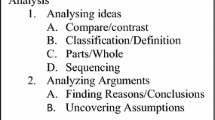Abstract
A practical test instrument was developed to assess students' attainment of skills associated with problem analysis and planning experiments, collecting information, organising and interpreting information, and concluding. Students verbalised their thoughts as they worked on the task and their performance was videotaped for analysis. Data collected from Year 7, 10 and 12 science students illustrate the development of investigation skills and reveal important areas of student weakness.
Similar content being viewed by others
References
Anderson, J. R. (1985).Cognitive psychology and its implications (2nd ed.). New York, W. H. Freeman.
Bryce, T. G. K. & Robertson, I. J. (1985). What can they do? A review of practical assessment in science.Studies in Science Education 12, 1–24.
Chi, M. T. H., Feltovich, P. J. & Glaser, R. (1981). Categorisation and representation of physics problems by experts and novices.Cognitive Science, 5, 121–152.
Ericsson, K. A., & Simon, H. A. (1980). Verbal reports as data.Psychological Review, 87, 215–251.
Friedler, Y., & Tamir, P. (1984). Teaching and learning in high school laboratory classes in Israel.Research in Science Education, 14, 89–96.
Hayes-Roth, B., & Hayes-Roth, F. (1979). A cognitive model of planning.Cognitive Science, 3, 275–310.
Johnstone, A. H. & Wham, A. J. B. (1982). The demands of practical work.Education in Chemistry, 19, 3, 71–73.
Larkin, J. H. (1979). Processing information for effective problem solving.Engineering Education, 70, 285–288.
Larkin, J. H., & Rainard, B. (1984). A research methodology for studying how people think.Journal of Research in Science Teaching, 21, 235–254.
Lawrence, J. A., Dodds, A. E., & Volet, S. E. (1983). An afternoon off: A comparison of adults' and adolescents' planning activities. Paper presented at the annual conference of the Australian Association for Research in Education, Canberra.
McGaw, B., & Lawrence, J. A. (1984). Developing expertise through education. HERDSA News,6, 3, 3–7.
Miller, R., & Driver, R. (1987). Beyond processes.Studies in Science Education, 14, 33–62.
Rowell, J. A. & Dawson, C. J. (1989). Towards an integrated theory and practice for science teaching.Studies in Science Education, 16, 47–73.
Schoenfeld, A. H. (1986). What's all the fuss about metacognition? Paper presented at the annual meeting of the American Educational Research Association, San Francisco.
Tamir, P. (1989). Training teachers to teach effectively in the laboratory.Science Education, 73, 59–69.
Tamir, P., & Lunetta, V. N. (1981). Inquiry-related tasks in high school laboratory handbooks.Science Education, 65, 477–484.
Tobin, K. (1986). Secondary science laboratory activities.European Journal of Science Education, 8, 199–211.
Voss, J. F., Tyler, S. W., & Yengo, L. A. (1983). Individual differences in the solving of social science problems. In R. F. Dillon & R. R. Schmeck (eds.).Individual differences in cognition. New York, Academic Press.
Woolnough, B., & Allsop, T. (1985).Practical work in science. Cambridge, Cambridge University Press.
Author information
Authors and Affiliations
Additional information
Specialisations: Science teacher education, development of problem-solving expertise, concept development and conceptual change, assessment of laboratory work.
Specialisations: Chemistry education, concept development and conceptual change, role of laboratory work.
Rights and permissions
About this article
Cite this article
Hackling, M.W., Garnett, P.J. Primary and secondary school students' attainment of science investigation skills. Research in Science Education 21, 161–170 (1991). https://doi.org/10.1007/BF02360469
Issue Date:
DOI: https://doi.org/10.1007/BF02360469




